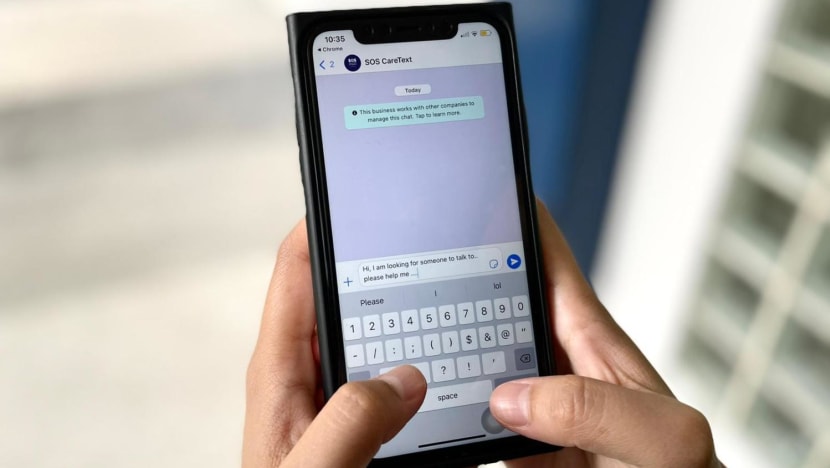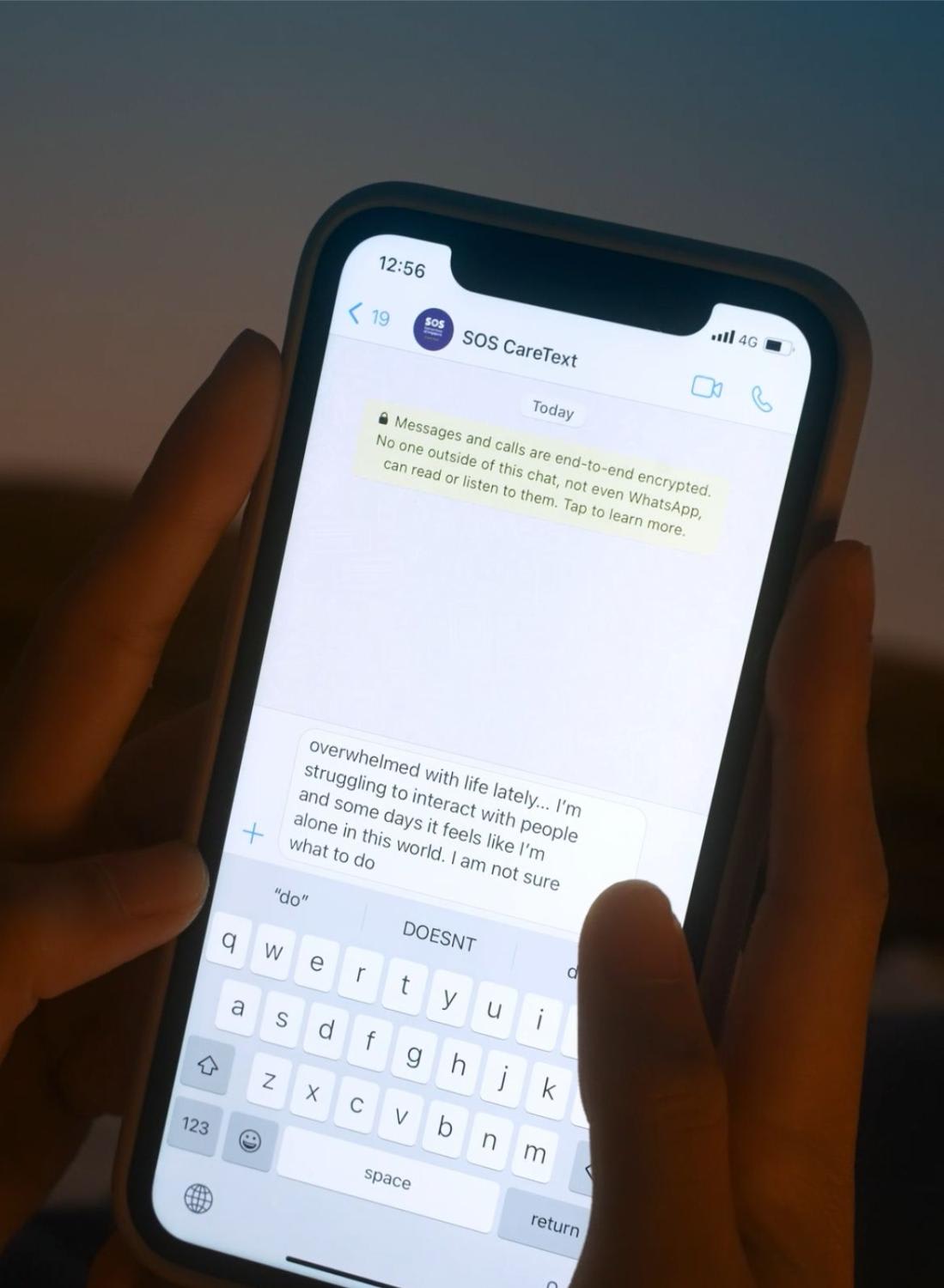SOS launches 24-hour WhatsApp service to help people in distress

Launched by the Samaritans of Singapore, CareText is a 24-hour WhatsApp-based support helpline. (Photo: SOS)
SINGAPORE: Suicide is the leading cause of death for young people aged between 10 and 29 in Singapore. Last year, 378 people took their own lives – nearly a third were in that age group.
This is one of the reasons the Samaritans of Singapore (SOS) has set up a 24-hour WhatsApp service to help those in distress.
People who need help can text 9151 1767 for support via CareText, or call 1767 to reach the hotline.
Officially launched on Saturday (Sep 10), the service, called CareText, is manned by SOS’ trained volunteers and staff.
First piloted in July 2020 on limited hours, it widened its coverage to run 24/7 in January this year for a trial, before the official launch.
During a survey in 2020, some youths told SOS that there was a lack of suitable and trusted avenues for them to turn to, said Mr Phua Chun Yat, SOS’ chief operating officer.
“We thought (texting) would be a good platform to reach out to youths and try to reduce the barriers of help seeking, especially at a time where I think there was a lot of uncertainty, people were starting to stay at home because of the pandemic,” he explained.
Last month, SOS answered almost 1,800 chats – nearly triple the number of chats received in August 2021. During the trial, the non-profit organisation found that about 82 per cent of the people who messaged were aged 29 and below.
HOW IT WORKS
Those using CareText remain anonymous throughout the text conversation and the volunteer or staff member cannot see the phone numbers.
When a person accesses CareText, they will be first asked basic questions, such as gender, age group and their distress level.
“Those questions … help us kind of know who we are talking to,” explained Mr John Lam, senior manager of crisis support at SOS.
“After that, they are engaged by our trained volunteers and staff. We are using the same method that we are using for the hotline, but adapted for texting.
“Our volunteers practise active listening. It’s important we listen to their problems – the pain points.
“We do accept there are suicide risks, and we do ask them if they are contemplating suicide. The conversation can go as long as they want. The objective is to de-escalate the crisis they are facing at that point in time.”
There are currently about 100 CareText volunteers and all of them have undergone about six months of training.
These volunteers have to learn to understand each texter, reflect back on what they say and the emotions they are going through.
Texts come in throughout the day and peak from 4pm to 2am, Mr Lam said. Usually text chats last longer than phone calls, a service which SOS provides via a suicide prevention hotline. Some text correspondence can go on for more than an hour.
Sometimes, a person texting may express suicidal tendencies. When that happens, the volunteer will look to work with the person to keep them safe.
“We tell the person, ‘I want to work with you to keep you safe’ … For example, if they are outside, the safety plan could be that they agree to go home because it is less (risky),” explained Mr Lam.
“Is there someone they can call now to stay with them and keep them safe – their parents or friends? In that case, then the plan is to find someone to help keep them safe.
“That’s where the training of volunteers is important, because essentially, there is no one way to de-escalate. It is very much working with the person to come to a place where I can de-escalate their crisis and keep them safe for the day.”
If the risk is “very immediate”, the volunteer will work with the texter to work out immediate solutions, such as contacting family or emergency services, said Mr Phua. Should they need further help, SOS will follow up with them and link them up with counsellors.
This is when volunteers or staff members will ask for the texter’s number if they need to call the texter.
KEY ISSUES
Most texters who contact SOS are below 29 years old.
More than 80 per cent of SOS’ trained CareText volunteers are also in this age group.
Among the key issues raised in the text conversations include relationship problems, issues at school or problems at home.
Some problems may have “intensified” as a result of the COVID-19 pandemic, said Mr Phua.
“Generally our mental health and stability have gone down, mental health issues have gone up because of the other stresses that come with the pandemic,” he added.
“Even though we are primarily focusing on suicide, if (people) are facing distress for various issues, they can text us. Our goal is really to help them reduce the level of distress … so they are able to find certain stability."

One of the difficulties is overcoming the stigma of asking for help. The question is how SOS can reduce the barriers to seeking help, he explained.
“One of the good things about COVID-19 was that it helped a lot of people to be vulnerable about what they have gone through,” said Mr Phua.
“And I think that has kind of reduced certain notions of stigma … I think we are going in the right direction in terms of that.”
The Samaritans are looking to recruit more volunteers to help. All volunteers will go through six months of training, including classroom-based training and practice in a simulated environment.
They will also be supervised during the live chats with people. These supervisors have access to all chats and can step in should volunteers need help.
SOS chief executive Gasper Tan said: “We hope that this consistency, along with its round-the-clock availability, will make it more accessible for individuals in distress to reach out for support.”
Where to get help:
National mental health helpline: 1771
Samaritans of Singapore Hotline: 1767
Singapore Association for Mental Health Helpline: 1800 283 7019
You can also find a list of international helplines here. If someone you know is at immediate risk, call 24-hour emergency medical services.
















